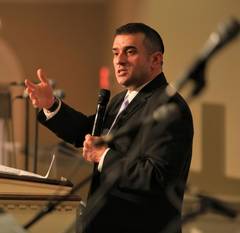- About Us
- Learning
- Resources
- Get Involved
- Membership
- Jobs
The Future God
03/13/2019 10:30:39 AM
| Author | |
| Date Added | |
| Automatically create summary | |
| Summary |
 We all make mistakes - sometimes we know something is wrong, yet we do it anyway, unable to curb our desires and heed the better angels of our nature. Sometimes we do something which we thought was right and proper at the time we did it, but actually turns out to have caused pain.
We all make mistakes - sometimes we know something is wrong, yet we do it anyway, unable to curb our desires and heed the better angels of our nature. Sometimes we do something which we thought was right and proper at the time we did it, but actually turns out to have caused pain.
The whole beginning of the book of Leviticus, which begins this week, lays out the steps that the ancient Israelites needed to take to rectify their mistakes. Different types of errors demanded different types of sacrifices - sometimes grain, sometimes animals and so on.
Curiously, the text also lays out what needs to be done if "the whole community of Israel has erred and the matter escapes the notice of the congregation," begging the question of how an entire community can err by accident. After all, communities are gatherings of people - people can sin, but a community can't do anything except through the hands of individual people.
Rashi, the most important of the medieval Jewish commentaries on the Torah explains that this refers to a situation in people act in accordance with the instructions of their leaders, but those instructions turn out to be sinful. In such a case says Rashi, it is the leadership, not the people, who bear responsibility for the sin. The people trusted their leaders, which is what they are supposed to do.
We live in an era we do not trust our leadership. There is hardly an institution of public life that has not been shown to betray pubic trust. From government White House corruption, to the wealthy buying places in our supposed meritocracy to crony capitalism and on and on, there are few public institutions, certainly of any size, that that deserve the trust they ask from the public.
It's sad to remember that once upon a time, a pop duo lip-syncing their own lyrics was considered a scandal, and we know things are bad when we are looking to the 1980s as a more innocent time.
It might yet be that our leaders will publicly repent of their sins and seek to rebuild the public trust that is the foundation of civic society. Until then, we might be well served to remember that the Jewish calendar leads us now only only to leviticus, with its instructions for expiating sin, but to Purim, with its instructions for weathering public catastrophe.
Towards the very end of Megilat Esther, we are told that the world was turned upside down (???????????? ?????) - nothing was as it seemed, nothing was what was expected. Such is the moment we live in as well. The book of Esther also suggests that we were created for a moment such as this.
The history of the Jewish people is one of outrageous hope and courage in moments when both seemed impossible. To be sure, there are bleak moments in our lives as individuals and as a nation. In those moments, perhaps Hebrew grammar can help us.
In the encounter between Moses and the Holy One at the burning bush, Moses asks what name he should use when people ask about the Holy One. The response from the Divine is a phrase that occurs nowhere else in Tanakh: Ehyeh asher Ehyeh.
This enigmatic phrase is sometimes translated to mean 'I am what I am,' or 'I am the One who is'. Most literally, the phrase means 'I will be what I will be', or more fundamentally, the Divine Name name belongs to the future tense. The call of religious life is to that which is not yet.
We are created for this moment, this moment that more than anything else, demands not despair, but hope.
Wed, November 5 2025
14 Cheshvan 5786
RABBI BRENT SPODEK

Join Our Mailing List
Privacy Settings | Privacy Policy | Member Terms
©2025 All rights reserved. Find out more about ShulCloud


